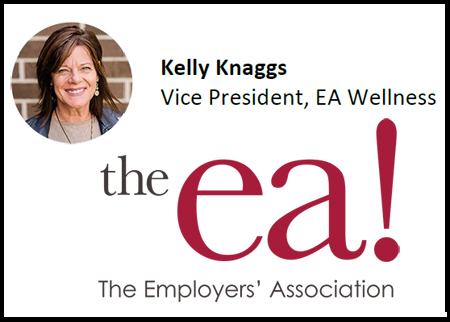In November, NAMI Toledo’s blog posted on NAMI’s StigmaFree Company program, which has been helping businesses and workplaces to go stigma free. In this post we interview Kelly Knaggs, Wellness Vice President of The Employers’ Association (The EA), about what The EA has done to address mental health in the workplace. The EA is a human resources association that aims to help its members build “truly great cultures and great organizations.”
NAMI Toledo: The EA won the 2020 Healthy Workplace highest award. Can you tell NAMI Toledo about what EA has done with its workplace to win that award (highlighting anything involving workplace mental health)?
KK: In late 2019, the EA invested in training and certification in the topic of “brain health for work and life” through the Amen Clinics as a way to introduce mental health into our employer wellness programming. In 2020, we launched 2 series with 4 sessions each around various topics of Brain Health which we offered to our employer groups.
We also built Brain Health programming into our internal wellness programming and incentivized our team to participate in lunch and learns and recorded webinars. As a follow up, we facilitated discussions around the material and application at work and home.
We also developed a “Mental Health Matters” webinar which focused on practical tips for managing mental health, encouraging connections, diet, exercise to build resilience, and meditation exercises. This interactive webinar also included recommendations for how to navigate the health care system explaining differences between an EAP, PCP, licensed therapist and psychiatrist.
At the beginning of COVID, each manager met individually with each team member as well as corporately as a full staff and smaller teams to talk about how their emotional lives were being impacted. Managers remained intentional about encouraging team member connections via skype, phone and walking meetings. We established a Healthy Conflict Task team to identify areas for improvement and made recommendations for best practices / norms moving forward.
NAMI Toledo: What are examples of some of the wellness consulting The EA does, especially as it relates to mental health?
KK: Currently EA Wellness provides consulting services using Daniel Amen, M.D., Brain Health Series One and Two and Mental Health Matters material (Click here for Webinar). Our plan for 2021 is to move into employer group coaching /group facilitation.
Brain Health Series 1: Fundamentals of Success, Lead by Example, Fuel High Performance, Kill the ANTs (Automatic Negative Thoughts).
Brain Health Series 2: Motivation Creativity and Innovation, Driving Change, 4 Circles of Brain Health, Protect your Future.
(Dr. Daniel Amen is a neuroscientist, double board-certified psychiatrist, mental health advocate, and ten-time New York Times bestselling author. “Brain care is central to your success and well-being. Properly nourishing the organ that controls how your body functions can support your physical and functional health, as well as improve your mental outlook and clarity.”)
NAMI Toledo: Why do you or does The EA think mental health should be addressed in the workplace?
KK: Because the problem is never the problem. If we disregard the underlying issues driving behavior or health we are applying band-aids vs. seeking transformational change.
NAMI Toledo: How can employers open the door for discussion about mental health?
KK: Employers can open the door for discussion about mental health first by leaders being authentic and more transparent about their personal challenges. Normalizing and encouraging counseling and/or coaching as growth opportunities and signs of strength. By providing educational opportunities for team members as personal and professional growth plan. And by coaching leaders on how to open basic conversations with their employees and equip leaders with options to resource employees.
NAMI Toledo: How can employers make it more comfortable for employees to be more open about mental health issues?
KK: We are using “Brain Health” to enter discussions around mental health and promote a holistic wellness program.
NAMI Toledo: What kind of resources do companies need for a workplace to work toward becoming stigma free?
KK: We have used Mettie Spiess material and invited NAMI Toledo and Harbor to speak at Annual Wellness Conferences. We also share articles about what it means to be Stigma Free. We include this information in our Wellness Bulletins to our employer groups.
(Mettie Spiess is a company that works to “help employers protect the mental well-being & psychological safety of their valued employees to proactively reduce the risk of crisis”)

